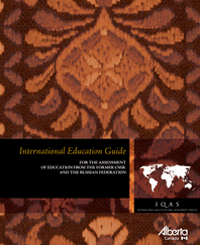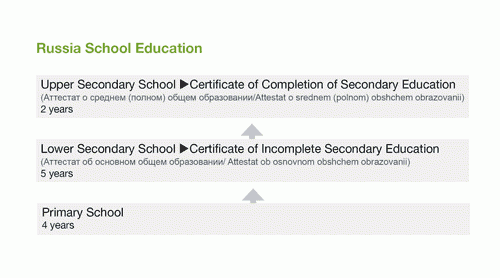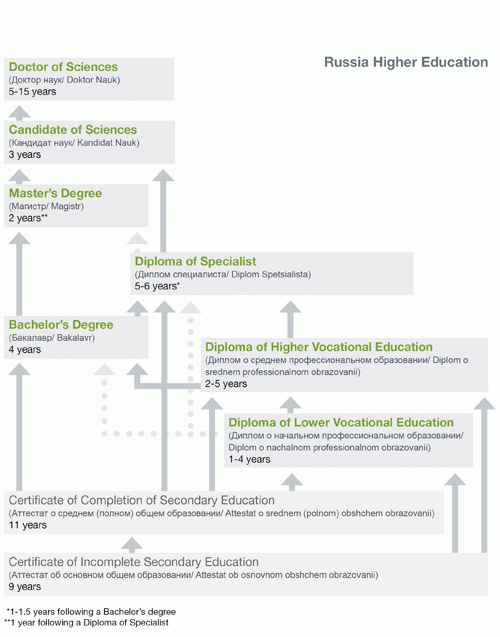Government mail service may be affected by the Canada Post labour disruption. Learn about how critical government mail will be handled.
Download guide

This is not an official IQAS assessment. The recommendations in this guide are for your information only. These credential comparisons represent common educational patterns within each country. They don’t take into account the recognition status of the institution through which a credential was obtained, the authenticity of the documentation, or the particular pattern of education followed by an individual.
Country overview
Official country name: Russian Federation
Location: Eastern Europe and northern Asia
Capital: Moscow
Area: 17.1 million square km
Population: 141.9 million (2010 - Federal State Statistics Service)
Ethnicity: Russians, representing 79.8% of the population, are the only people significantly represented in every region of the country; though the Russian Federation is home to as many as 160 different ethnic groups and indigenous people. Other ethnic groups include: Tatar, Ukrainian, Bashkir and Chuvash, amongst others.
Religion: Russia has large populations of non-practicing believers and non-believers. Russian Orthodox is the predominant religion of those practising worshipers in the Russian Federation. The remainder of the population is divided amongst Islam, Judaism, other Christian religions and Buddhism.
Languages: Russian is the only official language in the Russian Federation; however many of the individual republics have adopted their native languages as a second official language. Russian is typically the language of education.
Founding Date: In December 1991, the former Union of Soviet Socialist Republics splintered into Russia and 14 other independent nations.
Government and Administration: The Russian Federation is a federal republic where the president is the head of state and the premier is the head of government. The country is currently comprised of the following federal jurisdictions, which differ in the degree of autonomy each may exercise: 21 republics, 46 oblasts (provinces), 9 krais (territories), 2 federal cities (Moscow and Saint-Petersburg), 4 autonomous okrugs (districts), and 1 autonomous oblast.
School education

The Russian Federation currently follows an 11-year system of education, consisting of 4 years of primary school, 5 years of lower secondary school and 2 years of upper secondary school. Upon successful completion of upper secondary school, students receive a school-issued Certificate of Completion of Secondary Education (Аттестат о среднем (полном) общем образовании / Attestat o srednem (polnom) obshchem obrazovanii). This credential gives access to university study.
Higher education overview

With the implementation of the Bologna Process, the Russian Federation instituted both a bachelor’s and master’s degree. However, the traditional Diploma of Specialist, a longer first degree, continues to be widely offered.
Diploma of Incomplete Higher Education (Диплом о неполном высшем образовании / Diplom o Nepolnom Vysshem Obrazovani) may be issued after at least 2 years of study in a bachelor’s or specialist program and later used for re-entry into a relevant program. This diploma is not considered a degree; rather it is an intermediate qualification.
Bachelor’s degree (Бакалавр / Bakalavr) is the first degree in the Russian post-secondary system. General bachelor’s degrees involve 4 years of full-time study. Bachelor’s degrees may not be awarded in medicine or in related disciplines such as veterinary medicine and dentistry.
Diploma of Specialist (Диплом cпециалиста / Diplom Spetsialista) was the traditional first degree from the Soviet system, and continues to be offered in parallel with the new bachelor’s degree. The document is titled Diploma of [Specialization] (i.e. economist, teacher, engineer or doctor).
When taken as a first degree, a specialist’s diploma requires 5 years of full-time study, though medicine requires 6 years, as do some engineering and technology disciplines. When taken following a bachelor’s degree, the specialist diploma normally requires one to one-and-a-half years of full-time study.
Master’s degree (Магистр / Magistr) requires 2 years of full-time study beyond the bachelor’s degree, or 1 year of study beyond the specialist’s diploma.
Candidate of Sciences degree (Кандидат наук / Kandidat Nauk) requires a minimum of 3 years of study following a specialist’s diploma or master’s degree. It is focused on research and university teaching and includes both graduate courses and research.
Doctor of Sciences (Доктор наук / Doktor Nauk) is the highest academic degree awarded. Although the program has no fixed duration, in practice it generally requires 5 to 15 years of full-time study following the Candidate of Sciences program. Doctoral programs have no course component and focus solely on research.
Technical education
Formal Technical and Vocational Education programs in the Russian Federation are offered at both the secondary and post-secondary levels.
Diploma of Lower Vocational Education (Диплом о начальном профессиональном образовании / Diplom o nachalnom professionalnom obrazovanii) is typically referred to as the Diploma of Skilled Worker. Admission requirements vary, and students may be admitted based on the Certificate of Incomplete Secondary Education or the Certificate of Completion of Secondary Education.
The duration of studies varies between one and 4 years depending on the admission requirements and on whether the education incorporates complete secondary education. The Diploma of Lower Vocational Education gives access to employment; and if complete secondary education is incorporated into the studies, then the Diploma may also give access to higher education.
Diploma of Higher Vocational Education (Диплом о среднем профессиональном образовании / Diplom o srednem professionalnom obrazovanii) and a professional title (i.e. Diploma of Technician, Diploma of Nurse and etc) are awarded to students who successfully complete the requisite coursework and state final examinations. Admission may be based on the Certificate of Incomplete Secondary Education or the Certificate of Completion of Secondary Education.
The duration of studies varies between 2 and 5 years depending on the entrance requirements and on the type of educational institution attended. Graduates of higher vocational programs are entitled to apply to institutions of higher education and may receive advanced standing in relevant bachelor’s or specialist diploma programs.
Institutions
There are 3 major types of higher education institutions in the Russian Federation: universities, academies and institutes. Accreditation of an institution involves both institutional and programmatic accreditation. It is important to note that not all of the programs of an accredited institution may be accredited. Only accredited institutions may grant diplomas of the state format, and only for their accredited programs. The National Information Centre on Academic Recognition and Mobility provides a list of accredited higher education institutions.
Credentials comparison
| Credential | Entrance requirements | Length of study | IQAS comparison |
|---|---|---|---|
| Аттестат о среднем (полном) общем образовании (Certificate of Completion of Secondary Education) | Completion of Primary and Lower Secondary School / Certificate of Incomplete Secondary Education ( 9 years) | 2 years | Generally compares to the completion of a High School Diploma. |
| Диплом о начальном профессиональном образовании, (Diploma of Lower Vocational Education) | Certificate of Incomplete Secondary Education (9 years) or Certificate of Completion of Secondary Education (typically without entrance exams) (10 to 11 years) | 1 to 1.5 years following a Certificate of Completion of Secondary Education; 1 to 4 years if following a Certificate of Incomplete Secondary Education (3-4 year program typically incorporates complete secondary education). | Generally compares to the completion of vocational training. If vocational training is offered through a professional lyceum and the number of years and type of training warrant it, it generally compares to the completion of a 1-year, post-secondary Certificate. Note: Where training incorporates complete secondary education, the completion of a High School Diploma is acknowledged. |
| Диплом о среднем профессиональном образовании (Diploma of Higher Vocational Education) | Certificate of Incomplete Secondary Education (9 years) or Certificate of Completion of Secondary Education (typically without entrance exams) (10 to 11 years) | 2 to 4 years if admitted with a Certificate of Completion of Secondary Education; 3 to 5 years if admitted with a Certificate of Incomplete Secondary Education. | Generally compares to the completion of a post-secondary Diploma. If vocational training is provided through a college: - At a basic level: Generally compares to the completion of a post-secondary Diploma. - At an advanced level: Generally compares to the completion of a 3-year post-secondary Diploma. Note: Where training incorporates complete secondary education, the completion of a High School Diplom is acknowledged. |
| Диплом о неполном высшем образовании (Diploma of Incomplete Higher Education) | Certificate of Completion of Secondary Education and entrance exams (10 to 11 years) | 2 years | Generally compares to the completion of a 2-year post-secondary Diploma. |
| Бакалавр (Bachelor’s degree) | Certificate of Completion of Secondary Education and entrance exams (10 to 11 years) | 4 years | Generally compares to the completion of a 4-year Bachelor’s degree. |
| Диплом cпециалиста (Diploma of Specialist (5 to 6-year program)) | Certificate of Completion of Secondary Education and entrance exams (10 to 11 years) | 5 to 6 years; or 1 to 1.5 years following a bachelor’s degree | Generally compares to the completion of: - a 4-year Bachelor’s degree plus one year of a graduate Diploma, - a 5-year combined Bachelor’s degree (such as BEd/BSc. |
| Магистр (Master’s degree) | Bachelor’s degree or Diploma of Specialist and entrance exams | 2 years after a bachelor’s degree; 1 to 1.5 years after a Diploma of Specialist (not a common pattern) | Generally compares to the completion of a Master’s degree. |
| Кандидат наук (Candidate of Sciences) | Master’s degree or Diploma of Specialist, entrance exams and research qualifications | 3 years minimum, including research and optional coursework | Generally compares to the completion of a Doctor of Philosophy (PhD) degree. |
| Доктор наук (Doctor of Sciences) | Candidate of Sciences, academic position and research qualifications | 5 to 15 years | Represents the completion of post-doctoral research. |
| Диплом о среднем профессиональном образовании (Diploma of Higher Vocational Education (Non-University-level teaching credential)) | Certificate of Incomplete Secondary Education (9 years) or Certificate of Completion of Secondary Education (typically without entrance exams) (10 to 11 years) | 2 to 3 years if admitted with a Certificate of Completion of Secondary Education; 3 to 5 years if admitted with a Certificate of Incomplete Secondary Education | Training for preschool and primary teachers: Generally compares to the completion of a post-secondary Diploma. Training for lower secondary teachers: Generally compares to the completion of a 3-year post-secondary Diploma. Note: Where training incorporates complete secondary education, the completion of a High School Diploma is acknowledged. |
| Диплом cпециалиста (Diploma of Specialist (University-level teaching credentials) (5-year program)) | Certificate of Secondary Education and entrance exams (10 to 11 years) | 5 years | Generally compares to the completion of: - a 4-year Bachelor’s degree plus one year of a graduate Diploma, - a 5-year combined Bachelor’s degree (such as BEd/BSc. |
| Бакалавр (Bachelor’s degree (University-level teaching credentials) (4-year program)) | Certificate of Completion of Secondary Education and entrance exams (10 to 11 years) | 4 years | Generally compares to the completion of a 4-year Bachelor's degree. |
| Диплом cпециалиста (Diploma of Specialist (Medicine / Dentistry)) | Certificate of Completion of Secondary Education and entrance exams (10 to 11 years) | 4 to 6 years depending on the field of study | The Diploma of Physician / Stomatologist / Pediatrician / Hygienist, etc., generally compares to the completion of a first professional university degree in medicine, dentistry, etc. The Diploma of Nursing Supervisor generally compares to the completion of a 4-year Bachelor’s degree. |
Full credential templates
These templates give detailed information on educational credentials awarded for programs of study completed in The Russian Federation.
The templates include:
- official name of credential
- alternative names
- standardized English translation (if applicable)
- time period the credential was offered
- issuing body, admission requirements into the program
- descriptive program information
- recommendations on how the credential compares to educational standards in Alberta
Russian Federation - credential templates
Additional resources
- Ministry of Education of the Russian Federation
- National Information Centre on Academic Recognition and Mobility
- National Accreditation Agency of Russia
- Unified State Exam Portal
- UNESCO International Bureau of Education